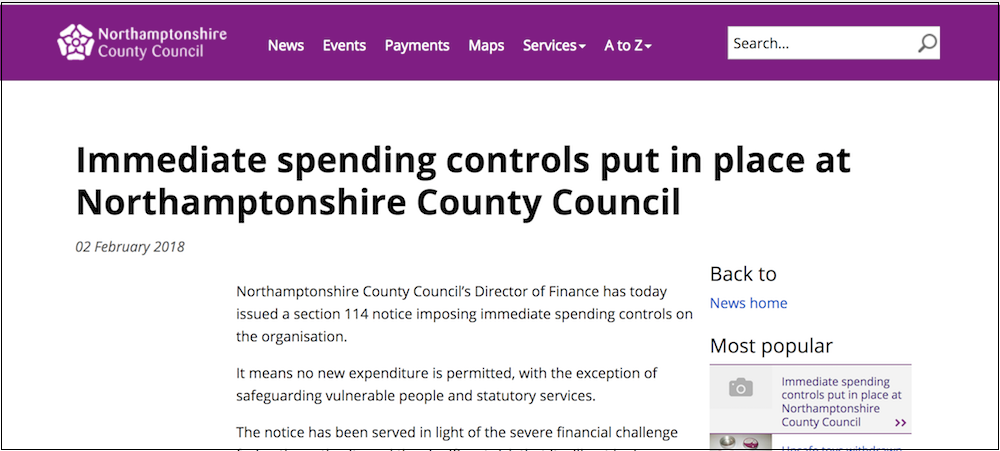
Northamptonshire council’s posting of a section 114 notice illustrates the county’s funding plight. Agent 151 wonders whether government will respond with more funding or continue to be a Scrooge.
Dickens has a story for all occasions. In A Christmas Carol Scrooge receives visits from four ghosts warning him that unless he changes his ways he is doomed to an unhappy end. Transformed by the experience, Scrooge saves himself (and Tiny Tim, in the process) and becomes the very personification of Christmas.
The government, cast by its own austerity policy in the role of the miserable miser, must surely realise that in Northamptonshire County Council’s plight it is encountering its very own first ghost.
The appointment of a government inspector under section 10 of the Local Government Act 1999, in the form of Max Caller, former chief executive of Hackney Council — where the last section 114 was issued 18 years ago — foreshadowed the issuance of a section 114 notice for Northants by less than a month.
The inspection was said to have been triggered by a second adverse value for money opinion from auditors KPMG, which identified “weaknesses in the compliance with proper financial and other processes” in some areas. The inspector’s role, to carry out an inspection of compliance with the best value requirements, was pitched by the secretary of state, Sajid Javid, as an investigation into “allegations of failures in financial management and governance”.
However, it is not clear yet that these allegations, although self-evident in light of the section 114, have pinpointed the root causes of Northamptonshire’s troubles.
Steel
It has been suggested by some that the inspection was not caused by the auditor’s report so much as by the very high profile Northamptonshire had achieved in the media in lobbying for more funds.
Some have gone further and speculated that the intervention was at the request of Northamptonshire itself, which had reached an internal stalemate and was simply unable to take the decisions needed to extricate itself from its problems. It is unlikely that the truth of the matter will fully emerge.
The diagnosis offered by the council leader of a “perfect storm” of increased demand and severe cuts is a diagnosis that could be applied to most councils.
Northamptonshire is historically a poorly funded council and thus facing more pressure than many. However, it seems likely that the real problem is that the decisions needed in order to balance the books have proven too difficult to take.
It is always possible to cut services. It is always possible to ration more stringently. It is always possible to find more efficiencies. Not having the appetite to change the strategy, or to take things that far, is the point at which the crisis is precipitated.
Intervention by the government provides the steel required to make the unpalatable decisions. Absolved of the responsibility for the inevitable cuts, the politicians are able to function again and time is created in which future arrangements can be negotiated and agreed.
The section 114 notice, a measure no doubt encouraged by the inspector, imposes immediate spending controls on the organization. No new expenditure — other than on statutory services for safeguarding vulnerable people — will be allowed, and councillors must meet within 21 days to discuss the implications of the notice. This meeting is scheduled to take place on 22nd February.
Signs
The government should take note that Northamptonshire’s crisis is a sign that after many years of finding budget reductions and simultaneously increasing resident satisfaction, councils no longer have the stomach to keep going.
Due to the referendum limit on council tax increases, which is effectively a cap by another name, there is no straightforward solution. Rob Whiteman, Chief Executive of CIPFA, recently tweeted that he has advised the government that more section 114 notices will be issued in the coming years as council reserves deplete and the demand for services continues to grow.
Local authority residents, cast in the role of Tiny Tim, continue to suffer as funding for councils continues to diminish. We can only wait in anticipation for the resolution of the story: will the miserly government realise the error of its ways and fund local services adequately? How many section 114s will it take? Or will it refuse to change and, as an inevitable consequence, face the grim reaper at a future election?
Agent151 is a senior local authority finance director and s151 officer writing exclusively for Room151.










